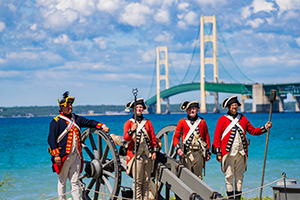Summer on Mackinac Island buzzed in the 1820s with the booming fur trade. Fort Mackinac was busy regulating the fur trade during this bustling time. The winter was a different story of long nights and monotonous work. This was the time that one of the most dramatic episodes to ever play out at Fort Mackinac happened, the Christmas Mutiny of 1829.


On Christmas Day 1829 a group of men stationed in the 5th United States Infantry, Company G left their barracks and hastily assembled on the parade ground. Numbering somewhere between 10 and 20, these men were forming for the purpose of rescuing a fellow soldier, Private Levi Stephens, from being whipped by their lieutenant, Ephraim Kirby Smith, for bringing alcohol into the fort. Most of the men had drunk quite a bit of alcohol during the day, which helped embolden them, and made enough of a ruckus to alert Lt. Smith, who came out to find this group arrayed in good order for no particular reason. In court martial testimony it was even commented on the good order of the men as they assembled. They were also armed with their muskets, bayonets fixed. Smith ordered the men to disperse and to lodge their weapons, but the group did not comply with his orders. Instead three men charged Lt. Smith with their bayonets.
Smith fought the men, parrying their blows with his sword and even managing to wound Private Gretzler on the head. However, Smith’s sword was broken and the rest of the company looked willing to join in the attack. Retreating from the engagement to retrieve another sword, Smith warned the other two lieutenants on duty with him, Lynde and Sibly, of the mutiny going on. At the same time he called out the guard and continued on his way to find another weapon. Though he did not find another sword, when he returned to the parade ground the men were dispersing and the guard was on the scene. The men returned to their quarters and shortly thereafter were confronted by Smith, who pointed out which men he remembered and had them arrested. Being short on temper, Smith was not willing to wait for a court martial to determine punishments for his assailants. He took Privates Genury, Gretzler, and Urquardt into his quarters and flogged them.


This was not a first for the men of Company G. Lt. Smith was well known for wrongfully and brutally beating his men. Private Charles Eddo, who led the Christmas Day charge, had been the victim of multiple floggings at the hands of Smith, though the crimes may not have warranted his severe punishment. One time Eddo was beaten by Smith with a club and cried out for Smith not to kill him, to which Smith replied, “You damned son of a bitch, I’ll kill you.” There were many more cases of brutality against the men of his company. More accusations against Smith came to light during the courts martial that would follow against the men for mutiny. Truths about Smith came to be known and the brutality his men had endured at his hands. Private Genury and Private Gretzler, both of whom were flogged by Smith for their involvement in the mutiny, commented on the damage he had done to other men in the company. Genury noted that Smith’s men had every right to fear Smith for his treatment. Gretzler also pointed out other men who had been beaten, often severely, like Private Peter Keller, who received scars that would last his entire life from Smith’s floggings. Gretzler mentioned in his defense that the group was there to get their rights back, and though a soldier did not have many, he had to protect those he had.
Despite their reasons, nearly all the men on trial were found guilty of mutiny and sentenced harshly. Of the seven convicted, six, Privates


Eddo, Urquardt, Genury, Gretzler, Shearer, and Francis, were sentenced to hard labor with a ball and chain attached to their legs for the remainder of their enlistments, forfeit four-fifths of their monthly pay, and have their heads shaved and be drummed out of the army following the end of their enlistments. The only one of the seven to escape the harshest of punishment was Private Peter White, who only received six months of hard labor and police duty, as well as loss of pay and his whisky ration for six months, and was to be confined in the black hole in the guard house when not working. But there would be a reprieve for these men. Following their court martial for mutiny, Lieutenant Colonel Enos Cutler, Fort Mackinac’s commander, called another court martial to investigate Smith for, “illegal, arbitrary, and unmilitary conduct.” In August of 1830, Smith faced six separate charges of unlawfully flogging soldiers both before the mutiny and on the day of the mutiny. The court found Smith guilty and he was discharged from the service. President Andrew Jackson, who had approved his dismissal, commented that an “officer who inflicts corporal punishment whilst in the heat of passion…renders himself doubly obnoxious to the charge of arbitrary conduct.”
Fortunately for the imprisoned men, their sentences were mostly remitted due to Smith’s poor conduct and illegal actions. Smith would return to service just two years later due to very strong political and family connections. He would continue to serve until the Mexican-American War when, at the rank of Captain, he was mortally wounded at the battle of Molino del Rey in 1847.








